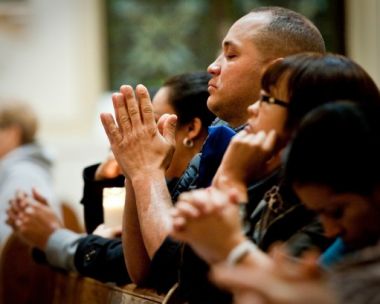Religion doesn't impact US views on immigration

While Pope Francis and Barack Obama may have found common ground on the issue of immigration reform in the US, new research suggests that for the average American, religion does not influence their opinions on the issue.
The Pew Research Centre's Religion & Public Life Project asked 1,821 US adults about their views on the need for immigration reform, and how undocumented workers in the US should be treated.
The results showed that overall there was relatively little difference between the views of religious and non-religious groups. On the whole, the same proportions of each supported similar positions.
When asked whether undocumented workers should be permitted to stay in the US if they meet certain requirements, the overall response was 73 per cent in favour, with 77 per cent of Catholics in favour, 69 per cent of Protestants, and 79 per cent of those without religious affiliation.
Just under half - 49 per cent - said they thought that it was important that Congress passed immigration reform. The religious breakdown shows that within that, 46 per cent of Protestants view immigration reform as important, as do 59 per cent of Catholics, and 49 per cent of the unaffiliated.
Despite not being less than important to just over 50 per cent of Americans, immigration reform is clearly of high priority to President Obama.
Speaking about his discussions with the Pope on the issue of immigration, President Obama said to reporters: "As someone who came from Latin America I think [Pope Francis] is very mindful of the plight of so many immigrants who are wonderful people, working hard, making contributions, many of their children are U.S. citizens, and yet they still live in the shadows, in many cases have been deported and are separated from families.
"I described to him how I felt that there was still an opportunity for us to make this right and get a law passed."
The area where the recent survey showed the least variation between the opinions of religious people and the general population was in attitudes towards the increase in deportations of undocumented workers.
Overall, 45 per cent of those asked thought this was a good thing. That view was shared by 46 per cent of Protestants, 47 per cent of Catholics, and 43 per cent of the religiously unaffiliated.
These kinds of results are a continuation of opinion trends noted by a Pew Research survey from 2010. Only 7 per cent of US adults responding to the survey said that their religious affiliation was the most important driver of their opinion on immigration.
The most important factor shaping people's opinions according to that survey was personal experience, with 26 per cent saying that was what shaped their views, with a further 20 per cent citing their level of education, and another 20 per cent sourcing their views from the media.
The numbers from the latest survey suggest that racial identity is an exceptionally significant force shaping people's opinion on immigration.
Among those who answered the question 'Should undocumented workers be allowed to stay legally if they meet certain requirements?', around 65 per cent of white Protestants agreed with letting such workers stay, compared to 76 per cent of black Protestants.
For Catholics, 70 per cent of white and non-Hispanic Catholics agreed that undocumented workers should be permitted to stay, but that number jumped to 91 per cent among Hispanic Catholics.
On whether more deportations of undocumented workers is a good thing, 51 per cent of white Evangelical Protestants agreed, starkly contrasting the views of black Protestants, of whom only 40 per cent supported such a view.
That same view was echoed by 56 per cent of white and non-Hispanic Catholics, compared to 35 per cent of Hispanic Catholics.
Hispanic Catholics are also much more likely to view immigration reform as important compared to their white and non-Hispanic fellows. Only 49 per cent of white and non-Hispanic Catholics viewed immigration reform as important for Congress, where as 73 per cent of Hispanic Catholics wanted to see more congressional action on that issue.
The fact that religiosity is not something that affects people's opinions on immigration is something senior Catholics in the US want to change. Yesterday, several prominent US Catholic bishops visited the town of Nogales in Arizona on the Mexico-US border, offering prayers and rememberence for those who died attempting to reach American soil.
The stated aim of their visit was to draw attention to what they called "the human consequences of a broken immigration system and call upon the US Congress".
They quoted from the passage from Leviticus that says: "The stranger who resides with you shall be to you as one of your citizens."











